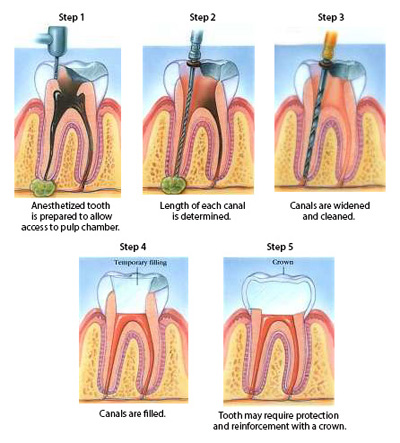My 15-year-old son had a cracked molar tooth, and his pediatric dentist gave us a referral to an endodontist. We were thinking about switching our son to our family dentist, so instead of going to the endodontist, I scheduled an appointment with the family dentist first. The family dentist prepared my son’s tooth for a crown. While my son wore the temporary crown, his gum was sore, he felt pain when biting, and the tooth was sensitive to cold. The pain didn’t linger, so our dentist placed the permanent crown.
My son’s symptoms got worse, so we returned to the dentist. The dentist did an x-ray and cold and pressure tests. My son did not feel pain with the pressure test. Our dentist said that my son could feel pressure in the crown for one to three months. There is no improvement in the tooth. It is sensitive to hot food, but the sensitivity doesn’t linger. Is his tooth nerve dying? I feel guilty because now I think I ruined my son’s tooth because I didn’t listen to his pediatric dentist. I should have taken my son to an endodontist. Thank you. Leah
Leah,
We understand your concern. You did what you thought was right. But you were also relying on your family dentist for help, too. Thank you for your description of your son’s symptoms. Although Dr. Finley would need to examine your son’s tooth, it seems that your son’s pediatric dentist was right. Your son should see an endodontist right away before the tooth gets worse.
Although we will not criticize you or your dentist, we think he should have taken more precautions. It is not normal for a tooth with a new crown to be sensitive to pressure for more than a few days. And your dentist explained that it could take one to three months?
Several factors should have alerted your dentist:
- Cracked tooth – It began with a cracked tooth. A crack can easily lead to infection and cause the pulp (the living tissue inside a tooth) to die.
- Sensitivity to cold after crown preparation – Maybe your dentist incompletely sealed your son’s temporary crown. Or extra irritation could have increased sensitivity. You didn’t mention if it was done, but your dentist could have chosen to coat the tooth with a desensitizing product.
- Temporarily cement the crown – Temporarily cementing the crown is less irritating to a tooth. If the symptoms don’t resolve, it is easy to remove the crown for root canal treatment. But permanently cementing a crown can further irritate a tooth and lead to root canal treatment.
- Sensitivity to heat – Now, your son’s crown is sensitive to heat. Although we will not say the damage is irreversible, it is getting close.

Careful root canal treatment can often save a tooth
Schedule an appointment with an endodontist right away. They are specialists with experience that most general dentists do not have. An endodontist will notice any subtle changes in the tooth ligament and let you know if they can save your son’s tooth with root canal treatment.
David Finley, DDS, of Monroe, LA, sponsors this post. Dr. Finley is a Fellow of the Academy of General Dentistry.





